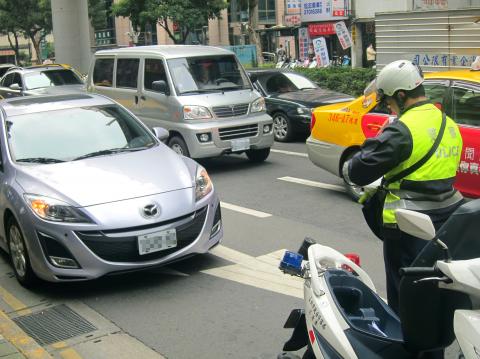In the past police had a reputation for writing a lot of traffic tickets, giving the impression they are not only cops, but robbers, too. They are keen to eradicate this image, and the number of tickets given out by policemen has been continuing to fall. According to statistics from the National Police Agency (NPA), people received just over 8.5 million traffic tickets in 2010, about 1.02 million less than the previous year. This figure marks a record low compared to the last few years.
According to the statistics, the number of category A1 traffic accidents — those in which the victims die within 24 hours — fell by 45 compared to 2009. The NPA said this was because policemen were, on the one hand, cracking down on serious traffic violations, and on the other adopting a policy of persuasion rather than punishment. When it comes to minor traffic violations they favor persuasion. This means that the number of both A1 traffic accidents and traffic tickets have fallen.
Lately the NPA has been reminding police again and again to only hand out tickets when it helps to improve traffic. It also emphasized the fact that tickets are reviewed, and that it reflects badly on senior officers when tickets are given out when they shouldn’t have been, especially in particularly conspicuous or unusual cases. It uses a series of measures to train police in when tickets should be given out. We are seeing less of the kind of glaring mistakes of the past.

Photo: Tsai Wei-chi, liberty times 照片:自由時報記者蔡偉祺
It is understood that nationwide the police used to give out nearly 20 million traffic tickets a year, opening them up to criticism from the public that they were ripping people off. Since then the police have changed their approach. They no longer use hidden cameras, and the number of tickets has been falling since 2003, dropping to around 10.69 million tickets in 2004. This figure was pretty consistent for the next few years, but fell below 10 million for the first time in 2009.
The police gave out 8,549,228 tickets in 2010, a fall of 1,026,013 compared to the 9,575,241 given out in 2009, representing a drop of over 10 percent. Looking at it more closely, the majority, more than 2.3 million, were speeding tickets, followed by those for illegal parking, accounting for around 1.7 million tickets. Third was for running traffic lights, for which more than 1.29 million were given.
Police statistics show that the highest number of tickets, 1.9 million, were given out by police in Taipei City, followed by those in New Taipei City, at 1.1 million, and then those given out by the National Highway Police Bureau (NHPB), in third place with more than 700,000 tickets.
(LIBERTY TIMES, TRANSLATED BY TAIJING WU)
由於警察過去經常開罰單,為洗刷「警察搶錢」印象,警察開交通罰單數量持續下滑,根據警政署統計顯示,國人九十九年一共接到八百五十四萬九千多張交通罰單,比前一年少了一百零二萬六千多張,這也是近年新低。
根據統計二零一零年A1類交通事故(指受害者於二十四小時內死亡)死亡人數,也比二零零九年少四十五人,警政署認為,這是因警察一邊取締惡性交通違規,另一方面確立「勸導重於處罰」政策,對於輕微交通違規,以勸導為主,使得A1類死亡人數與罰單能同步下降。
警政署近來時時提醒員警,開罰單必須要有益交通改善才開,加強罰單的審核機制,遇開單錯誤,若情形嚴重、離譜,還會對員警的長官連坐處分,利用一連串措施,逐步提升員警開單品質,以往罰單出現的離譜錯誤已不常見。
據了解,早年全國警察一年至少開出近二千萬張罰單,招致警察向老百姓「搶錢」批評,後來警方改變取締方式,不再以偷拍方式取締,使得罰單數從二零零三年開始下降,二零零四年更降至一千零六十九萬張,之後便一直維持這個數量,但二零零九年首次低於一千萬張。
二零一零年警察機關一共開出八百五十四萬九千二百二十八張交通罰單,較二零零九年的九百五十七萬五千二百四十一張,減少一百零二萬六千零一十三張,下降比率超過一成。進一步分析,以超速最多,共取締二百三十多萬件,其次是違規停車,有一百七十二萬餘件,第三名是闖紅燈及其他不遵守號誌,共開出一百二十九多萬張罰單。
依取締機關統計,以台北市開出一百九十萬餘張罰單最多,新北市去年開出一百一十一萬多張居次,第三為國道警局的七十萬餘張罰單。
(自由時報記者黃敦硯)

In an effort to fight phone scams, British mobile phone company O2 has introduced Daisy, an AI designed to engage phone con artists in time-wasting conversations. Daisy is portrayed as a kindly British granny, exploiting scammers’ tendency to target the elderly. Her voice, based on a real grandmother’s for authenticity, adds to her credibility in the role. “O2” has distributed several dedicated phone numbers online to direct scammers to Daisy instead of actual customers. When Daisy receives a call, she translates the scammers’ spoken words into text and then responds to them accordingly through a text-to-speech system. Remarkably, Daisy

Bilingual Story is a fictionalized account. 雙語故事部分內容純屬虛構。 Emma had reviewed 41 resumes that morning. While the ATS screened out 288 unqualified, she screened for AI slop. She could spot it a mile away. She muttered AI buzzwords like curses under her breath. “Team player.” “Results-driven.” “Stakeholder alignment.” “Leveraging core competencies.” Each resume reeked of AI modeling: a cemetery of cliches, tombstones of personality. AI wasn’t just changing hiring. It was draining the humanity from it. Then she found it: a plain PDF cover letter. No template. No design flourishes. The first line read: “I once tried to automate my

Every May 1, Hawaii comes alive with Lei Day, a festival celebrating the rich culture and spirit of the islands. Initiated in 1927 by the poet Don Blanding, Lei Day began as a tribute to the Hawaiian custom of making and wearing leis. The idea was quickly adopted and officially recognized as a holiday in 1929, and leis have since become a symbol of local pride and cultural preservation. In Hawaiian culture, leis are more than decorative garlands made from flowers, shells or feathers. For Hawaiians, giving a lei is as natural as saying “aloha.” It shows love and

1. 他走出門,左右看一下,就過了馬路。 ˇ He walked outside, looked left and right, and crossed the road. χ He walked outside and looked left and right, crossed the road. 註︰並列連接詞 and 在這句中連接三個述語。一般的結構是 x, y, and z。x and y and z 是加強語氣的結構,x and y, z 則不可以。 2. 他們知道自己的弱點以及如何趕上其他競爭者。 ˇ They saw where their weak points lay and how they could catch up with the other competitors. χ They saw where their weak points lay and how to catch up with the other competitors. 註:and 一般連接同等成分,結構相等的單詞、片語或子句。誤句中 and 的前面是子句,後面是不定詞片語,不能用 and 連接,必須把不定詞片語改為子句,and 前後的結構才相等。 3. 她坐上計程車,直接到機場。 ˇ She took a cab, which took her straight to the airport. ˇ She took a cab and it took her straight